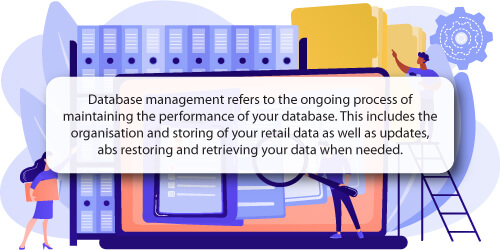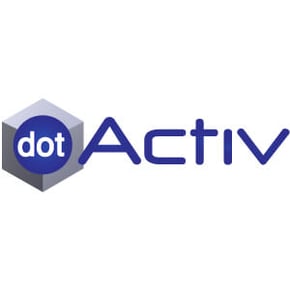Let's assert the following point: your data is essential to your success as a retail business. It then makes sense to argue that it's critical to manage it. However, managing and maintaining a retail database to ensure you always work with clean and relevant data can be a full-time job. And who's to say you have the time or resources to manage your database effectively?
That’s where a specialist solutions provider such as DotActiv, which offers a database management service, plays a role.

But we’re getting ahead of ourselves. Before we can consider the services that DotActiv offers, it’s worth unpacking the best practices to manage your retail database effectively. That's if you're interested in attempting this in-house. If not, you’re welcome to talk to us - we're happy to provide you with advice and a solution tailored to your needs.
Effective database management includes sound data security
When you're talking about processing and storing your data, the question of data security often comes up. And with good reason. How can you expect to manage and maintain a retail database effectively without ensuring its protection?
The short answer is, you can't.
By implementing data security strategies, you can protect against any cyber-attacks, insider threats and, as IBM points out, human error, which “remains among the leading causes of data breaches today.”

As we’ve mentioned in articles, such as this one which unpacks how DotActiv ensures data security, your data includes confidential information such as store, product, market and shopper data.
But what are a few best practices when it comes to data security?
- Implement strong passwords and change them regularly
Implementing strong passwords should be your first step when managing any database, be that for your company or a client. It includes ensuring that everyone with access has a dedicated login with a strong password.
How you set up your password is up to you, so long as it meets industry standards. Microsoft recommends passwords of at least 12 characters, but 14 characters are best. Other experts recommend at least eight characters. But your password combination remains the same no matter who you talk to - it must contain uppercase, lowercase, numbers and symbols.
It’s a practice that DotActiv follows. We also change the passwords of all databases regularly to adhere to any password policies.
- Limit access to servers to a few trusted and trained employees
Another best practice is to limit access to the servers which host your data. The fewer people who have access, the easier it is to secure it.
Also, as Oracle points out in its documentation, “access based on security allows you to create protection for resources that should only be transmitted over a secure channel”. It also helps you protect the integrity of your files.
- Ensure you conduct weekly security checks and backups
A third best practice is to ensure security checks and backups. In the case of a retail database, that includes integration checks.
If you consider how we do this at DotActiv, we first give clients the option to host their database on their servers, or ours. When hosting the database on our servers, we ensure frequent backups to different site servers to minimise the changes of data loss. We also secure the database on our server behind a firewall with weekly security checks.
Over and above this, we retain daily differential backups for minimal impact if a restore is needed.

Effective database management ensures proper data maintenance
Data security is a vital aspect of managing your databases effectively. That goes without saying. However, before you get to such a point, there is the matter of dropping your data into a database.
From there, it's all about maintaining its integrity. Proper data maintenance involves regular checks for accuracy and relevance. But what does that look like?
Here are two (of many) best practices you can implement.
- Train your team on how best to collect and input data
If you have people dedicated to maintaining your data, they need to know how to collect and input it. It doesn't matter if you have an automated system to collect your data or if you do this manually. Ideally, you'd want to have an automatic system. But what happens if something goes wrong with your system? That's where your trained staff can step in.
At DotActiv, when we first receive your data, we check everything to ensure it aligns with our expectations. That includes looking at the data types, date format, and no NULL values. We then confirm what we expect so that whenever you want to drop data, everything runs as expected.
- Ensure regular spot checks on the quality of data
Data is not static. It changes. With that in mind, it’s critical to complete spot checks. How often you do spot checks is up to your environment and needs. Weekly is a good place to start and, depending on your needs, you could push that to bi-weekly.
The bottom line is, that so long as you can ensure your data quality remains at a level that you can get the most out of it, it’s up to you.
If you use DotActiv’s Database Management services, you can expect weekly checks. Every Monday, we complete integration checks for our clients to ensure everything is correct and all data has been imported correctly.
We also run scripts to ensure your data is clean and in place. To ensure there are no duplicates, we use our Import Utility, which assures data quality.

Effective database management means establishing policies and procedures
Having the right policies and procedures for when you interact with data speaks volumes to your effectiveness as a retail business. If you don't have any, or they are not properly implemented, how can you expect to maintain proper control over your data?
Again, the answer is straightforward. You can't.

Below are a few best practices for you if you’re attempting this in-house. They are also part of DotActiv's approach when delivering our Database Management service.
- Know what actions or steps to follow if something goes wrong
While database issues might not be something that you want to run into - you do need to be prepared if something goes wrong. In such instances, you’re better off if you have a plan in place to understand the steps you must take to fix the problem.
It includes plans around data maintenance, easy access to data when needed and even security issues.
To pre-empt any issues from occurring, DotActiv’s development team continually looks for new and innovative solutions to make our database robust. It’s for the benefit of any pre-existing and current clients.
- Have policies across all stages of the data lifecycle
Another key to effective database management - and especially when considering your policies and procedures - is to consider the different types of policies.
You can have policies which cover all the different stages of your data lifecycle. That includes the collection, processing and cleaning, input and disposal of data. What you do at each stage matters because if you fail to complete any correctly and diligently, you’ll end up with dirty data that is nearly impossible to use.
At DotActiv, following the integration phase, we usually only connect to your database if we know we need to trigger updates for our Import Utility, complete tasks, and any requested maintenance, for example. We also have policies and procedures for how we approach each of these tasks so you can rest assured that your database is secure.

Effective database management starts with the right mix of software and services
As we've pointed out in this article, the inefficient management of your database, and retail data within it, leads to outdated information. That can become particularly troublesome if you consider that the data surrounding category management is complex. A poorly managed database hinders your functionality and reliability.
It's why investing in the right toolset and mix of specialised software and services is vital.
Vital not only for yourself if we were to look at the broader picture, but also for your customers. The data you use informs your assortment planning, planogramming, floor planning, and clustering efforts. Your data helps you decide what products to place on the shelf.
With our years of experience in retail, DotActiv knows how to build, host and maintain your category management database so you can focus on your core business. Chat with a DotActiv expert today.
So what does the right mix of software and services look like? It depends on your needs and if you want to complete this in-house or choose a third-party specialist like DotActiv to assist you. Considering the latter, it's best to look at the benefits of such a service.
- It provides you with a central data storage point and an integrated database
Let’s be honest. No one likes having to trawl through information when it's not neatly packaged or in one place. That wastes your time and leaves you feeling frustrated. You have more pressing matters that demand your attention.
By providing a central data storage point and an integrated database, you can focus on what’s core to your business without spending unnecessary time working with data from different sources. Simultaneously, it ensures that your data is accessible, so there is no delay when making critical business decisions.
- You get access to database management expertise and experience
The quality of a Database Management service relies on many factors, including the knowledge and expertise of those delivering it.
That’s why it’s ideal for any retailers who don’t have the time or resources. It also reduces the workload for your IT and Business Intelligence teams.
By relying on an expert that understands the intricacies, bottlenecks and best practices to ensure speedy data deployment, you can be confident that you base your category management decisions on the latest data available.

Conclusion
Managing any category management database effectively relies on you being prepared. That comes from ensuring you have a plan to maintain, secure and access your data. And if you run into problems? That’s where policies and procedures play a role. Fortunately, you don’t need to do this alone.
Let DotActiv help you overcome any roadblocks associated with your database by hosting, building and maintaining your database for you.
To discuss your unique database requirements and how our database management services can help you, book a complimentary consultation with a DotActiv expert here. You can also browse our software and service options on our online store.



